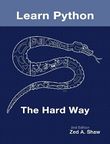Learn Python the Hard Way
From Hackerspace.gr
| external link |
Starts | Organizer |
|---|---|---|
| Mon 16 Nov 2015 18:30 | ||
| Ends | Event Owner | |
| Mon 16 Nov 2015 20:30 | User:Ebal |
- Κάθε Δευτέρα, 18:30-20:30
- Συναντήσεις για εκμάθηση προγραμματισμού σε python.
Θα είναι υπό την μορφή study group, δηλαδή όλοι θα μαθαίνουμε παρέα και δεν θα υπάρχει κάποιος "δάσκαλος". Οι συναντήσεις είναι ανοιχτές σε όλες και όλους - αρκεί να φέρεις το laptop σου! Απευθύνονται σε ανθρώπους που θέλουν να ξεκινήσουν με python κι άρα θα είναι αρκετά εισαγωγικές. Η μοναδική δέσμευση είναι να τηρηθεί αυστηρά το ωράριο (δηλαδή εάν κάποιος ή κάποια αργήσει, να μην μας ζητήσει να γυρίσουμε πίσω για να καλύψουμε κάτι που έχουμε ήδη πει).
- Θα ακολουθήσουμε την παρακάτω ύλη: http://learnpythonthehardway.org/book/
- Στις προηγούμενες συναντήσεις έχουμε καλύψει μέχρι και την:
Exercise 37: Symbol Review
http://learnpythonthehardway.org/book/ex37.html
notes on previous event:
https://www.hackerspace.gr/wiki/Learn_Python_the_Hard_Way_20151109
#!/usr/bin/python2
class Thing(object):
def test(hi):
print "hi"
a = Thing()
a.test("hello")
---------------------------------------------------------------------------
TypeError Traceback (most recent call last)
<ipython-input-3-de9b2a649c54> in <module>()
----> 1 a.test("hello")
TypeError: test() takes exactly 1 argument (2 given)
# The Fix is to add self as an argument in function test
# class Thing inherit from object
class Thing(object):
# In python we need to add self
def test(self, hi):
print hi
a = Thing()
a.test("hello")
hello
- - - - -
Spades = [1,2,3,4,5,6,7,8,9,10,'J','Q','K']
Hearts = [1,2,3,4,5,6,7,8,9,10,'J','Q','K']
Diamonds = [1,2,3,4,5,6,7,8,9,10,'J','Q','K']
Clubs = [1,2,3,4,5,6,7,8,9,10,'J','Q','K']
Cards = [ Spades, Hearts, Diamonds, Clubs]
The exercise:
#!/usr/bin/python2
ten_things2 = "Apples Oranges Crows Telephone Light Sugar"
ten_things = "Apples Oranges Crows Telephone Light Sugar Apples Oranges Crows Telephone Light Sugar"
print "Wait there are not 10 things in that list. Let's fix that."
# pydoc2 string
# split(s, sep=None, maxsplit=-1)
# a list variable
stuff = ten_things.split(' ')
# a list variable
more_stuff = ["Day", "Night", "Song", "Frisbee", "Corn", "Banana", "Girl", "Boy"]
# an alternative way
# while len(stuff) != 10:
# while len(stuff) is not 10:
while len(stuff) <> 10:
if len(stuff) > 10:
stuff.pop()
else:
# pydoc2 list
# remove and return item at index (default last)
# tin 1h fora: next_one = the last item of more_stuff, Boy
next_one = more_stuff.pop()
print "Adding: ", next_one
# Add next_one to the end of list stuff
stuff.append(next_one)
print "There are %d items now." % len(stuff)
print "There we go: ", stuff
print "Let's do some things with stuff."
# ten_things = "Apples Oranges Crows Telephone Light Sugar Apples Oranges
# Crows Telephone Light Sugar"
print stuff[1]
print stuff[-1] # whoa! fancy
print stuff.pop()
# pydoc2 str
"""
| join(...)
| S.join(iterable) -> string
|
| Return a string which is the concatenation of the strings in the
| iterable. The separator between elements is S.
"""
print ' '.join(stuff) # what? cool!
print ''.join(stuff) # what? cool!
print ':ebal '.join(stuff) # what? cool!
print ""
print stuff
# pydoc2 slice
# slice(start, stop[, step])
print stuff[3:5]
print "#".join(stuff[3:5]) # super stellar!

